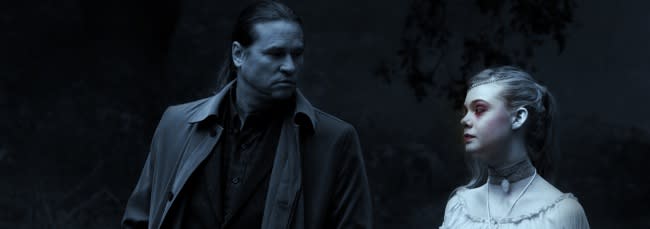Toronto 2011 Review: ‘Twixt’

It's hard to think of a film that serves as a better test case for all the rewards and pitfalls of total creative freedom than "Twixt." Since emerging from a 10-year hiatus with 2007's "Youth Without Youth," director Francis Ford Coppola has focused on peculiar, personal films outside of the studio system that are full of operatic flourishes and storytelling brio. That these films haven't been that good is almost beside the point: Watching "Youth Without Youth," "Tetro" and now "Twixt" is to see a veteran filmmaker going his own way and playing with styles and genres like a kid playing make-believe in the backyard. But this freedom would be much more liberating if Coppola's coy humor and playful adventurousness led somewhere. And in "Twixt," they just don't.
Opening with narration by Tom Waits that's thick with his trademark weird-guy-by-the-dump intonation, "Twixt" tells the tale of Hall Baltimore (Val Kilmer), a hack sub-Stephen King horror writer who is visiting a small town to promote his latest book. Nobody there seems to care, but he does latch onto a local story of a murdered young girl that remains unsolved. Inspired by the crime to write a new book -- one he desperately needs an advance for -- Baltimore begins to see visions of a ghostly girl (Elle Fanning) and his idol, Edgar Allan Poe (Ben Chaplin), who help him piece together the clues of the mystery.
Shot in digital, including two brief 3D sequences, "Twixt" is an undeniably loopy affair, one that seems to have its tongue in its cheek but also wants to deliver hypnotic dream sequences that are quite arresting. And right there you have the dueling instincts of "Twixt" in a nutshell: It's the work of a powerfully visual director who seems to be enjoying this just-screwing-around period of his career a little too much. You can dig "Twixt" for its oddball charm, but just as easily you can get very irritated that a man with this much talent is wasting it on doodles that contain hints of greatness.
That greatness is most noticeable in the dream sequences, which take the hyper-stylized aesthetic of a "Sin City" and invests it with real dread and otherworldly atmosphere. And while the performances set in the real world of the small town tend toward B-movie camp -- Bruce Dern as the nutsy sheriff is particularly tough to take -- Chaplin and Fanning exude a pleasingly ethereal quality in the dream sequences. (It's worth pointing out that Coppola has long admired Woody Allen for his ability to make his own movies without the demands of studios. With its different realities and its central relationship between a mediocre writer and his literary hero, "Twixt" is sort of his "Midnight in Paris.") But the film's central whodunit really doesn't interest Coppola, who's too busy weaving together arresting visuals and drawing an unlikely connection between the murder and Baltimore's own past, one that draws a parallel between the film's main character and Coppola in a way that's clearly not meant to be coincidental.
As for Kilmer, he's had a knack of late for playing slightly spacey characters who seem to fit right in step with their filmmakers' preoccupations. He did this with David Mamet's "Spartan" and Werner Herzog's "Bad Lieutenant," and he does it again here, seemingly both in on the joke but also oddly earnest about Baltimore's personal journey. It ought to be laughable -- in a way, Kilmer has never really stopped playing Jim Morrison's blissed-out radiance -- but once he establishes his rhythm he sticks with it, and he becomes a cockeyed guide through this bizarre movie.
Should you see "Twixt"? If you're doubtful, then you shouldn't. Like Coppola's other recent films, it's for fans and the curious only. The movie's simply too willfully strange -- too "Hey, let's try this" -- for anyone who isn't willing to meet it more than halfway. It doesn't add up to much, so you'll have to enjoy it for its curlicues and sheer audaciousness. I was up to a point, but when you know what Coppola is capable of, "Twixt" can't help but feel a little too easy, a little too dashed-off. What good is freedom if all it leads to is self-indulgence?
Grade: C+


